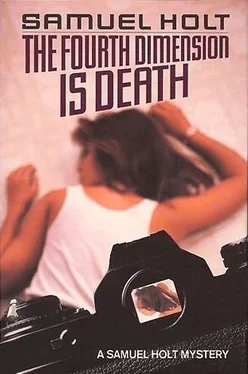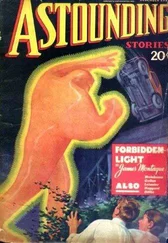Samuel Holt
The Fourth Dimension Is Death
I never did think Dale Wormley looked like me. We all have that experience, I suppose, the false twins out there in the world, people who are claimed by our relatives and friends to look astonishingly like us. A roommate or a brother comes home and says, “I just saw somebody on the bus and I could have sworn it was you, I almost said something, it was absolutely uncanny.” And for a little while we find ourselves wondering about that doppelganger, what that other life might be, is it better or worse than our own, happier, sadder, easier, more exciting...
Well, I met my doppelganger, and I don’t believe he looked that much like me. And I didn’t envy his life, either. Nor his death.
If your face and voice become known to the public in a positive sense, because you’re a famous politician, perhaps, or a major sports figure, or, like me, because you did time for five years as the lead in a successful television series, your doppelganger may turn out to be someone who will try to make a career out of that accident of similar appearance. There are now “talent” agencies specializing in celebrity look-alikes and celebrity sound-alikes (there’s even a kind of ghostly living still to be made from looking like Charlie Chaplin or sounding like W. C. Fields, which is a joke on somebody), and the result is, from time to time it becomes necessary for a person in my position to guard the shores of his own existence, to beat back incursions made by the doppelganger into what is, after all, private turf.
And that’s what happened between me and Dale Wormley. For five years I played the brilliant criminologist Jack Packard in the television series called PACKARD, and then three years after I was finished with the part (I hope) this Dale Wormley started playing a Jack Packard look-alike on television commercials for a supermarket chain throughout the northeast. The imitation of a living person and of a copyrighted fictional character was offensive to begin with, and the manner of the imitation made it even worse, since Jack Packard was portrayed in the commercials as a self-satisfied bully, so when we first became aware of the impersonation Morton Adler, my New York attorney, sent letters to the ad agency and the supermarket chain, requesting them to stop, and when that didn’t convince them we sued.
Which was ironic enough to begin with. I had come to actively dislike Jack Packard, and here I was forced to defend him against unauthorized use. The five years I’d spent in the part had been fine, but once the series was finished — ended by the weariness of everyone connected with it, not by any lack of public enthusiasm — I had been ready to move on to other things, but it turned out Packard wasn’t ready to let me go. My identification with that character and that series is still so strong that I’m essentially unemployable in any other role, though God knows my agent, Zack Novak, and I have both done our best to find me something. Not for the money, PACKARD reruns have solved my financial problems for the foreseeable future, but for the work. I don’t want to hang around, I want a job.
So I certainly didn’t feel like defending Jack Packard from imitation, but there it was. My co-owners of the syndication rights were also part of the suit, of course, and the actual process was being handled by Morton Adler, so it more or less progressed without me the first few weeks — except for a couple of long LA-NY phone calls with Morton — and didn’t become an actual ongoing thing in my life until October and my semiannual migration to New York.
For a kid like me, who grew up on Long Island, New York City always was, is now, and ever will be the center of the known and unknown universe. As soon as I became rich enough to indulge my every whim, I bought a nice brick townhouse on West 10th Street in Greenwich Village, and filled it with dark comfortable furniture, and got on first-name terms with Tony, my neighborhood Italian greengrocer. Of course, since then Tony has retired to Florida, and his business has been taken over by a numerous and hardworking Korean family, with whom I am on merely smiling and nodding terms; I cannot attempt to find out the first names of people whose hand-lettered signs announce they are selling such items as reeks and arugura. (“Curryflower” is their finest and most complex creation so far, I think.)
However, despite being the center of the universe, New York City happens to have a climate which is at times inimical to man. Summer in the city duplicates the environment on the surface of the planet Mercury, and deep winter there is rather like downtown in the Asteroid Belt. Therefore, I keep my house in Bel Air as well, where I don’t have to check the calendar before using the pool, and split my life between these two bases. I’ve heard my kind of bicoastal existence described as ‘apples and oranges’: spring and fall in New York, summer and winter in LA.
Fall. October 12th. The leaves were flying, and so was I. Normally, Robinson and I would have flown LAX-Kennedy on commercial air, but at a party recently in Malibu I’d met an executive of a multinational computer company called DSI, and had accepted his invitation to travel east on a company jet. In addition to the pilot and copilot and stewardess, there were six of us aboard, being Robinson and me, our host, and three other DSI executives, all on their way to DSI’s world headquarters in New York. They’d be taking meetings there on some major drive DSI had planned for Great Britain, where the computer revolution is coming along briskly, just a few years behind ours. Their stock market had just recently undergone what they called the Big Bang, which in essence meant that British subsidiaries of American brokerages were permitted at last to do business in the City, and with American businesses would inevitably come American business methods, which these days means one computer terminal per employee; a nice opportunity for DSI.
My own business has never reached Great Britain, I’m not sure why. When PACKARD was still an active show, it was sold in Italy and Sweden and parts of South America, all dubbed into the foreign language, and in Holland, where it was shown in English with subtitles. Rerun money still comes sporadically from all those places, but the British market was just never interested in the affairs of Jack Packard. I’ve heard theories ranging all the way from the idea that Packard was too American, to the idea that he wasn’t American enough. Now, of course, with the show long gone and only me left on my raft on the empty ocean, the question is academic.
I thought the flight with the DSI people was pleasant and fun, a superior way to get from one coast to the other, but Robinson found it absolutely delightful, and that’s because he met a fan; a thing that doesn’t happen to Robinson very often. William Robinson, now 73, was himself an actor for nearly forty years, coming into his own in the movies of the thirties and forties, where he played hoity-toity servants, far more upper class than the people they worked for. He did disagreeable butlers, disapproving valets, supercilious majordomos and, in the war years, the occasional stiffbacked aide-de-camp. He played a fifty-year-old for twenty years, until he became a fifty-year-old, and then went on playing the same age for another decade.
What happened to Robinson’s career was neither age nor ambition, but a simple profound change in American fiction. Gruff millionaires and their heedless headstrong daughters faded from the scene, as did willowy semi-male upper class amateur detectives, madcap heirs and heiresses, luxury travelers on transAtlantic liners and lovable nouveau-riche midwesterners scaling the social walls of Boston and New York. With them, their trains of servants also disappeared, and there went Robinson’s occupation.
Читать дальше












